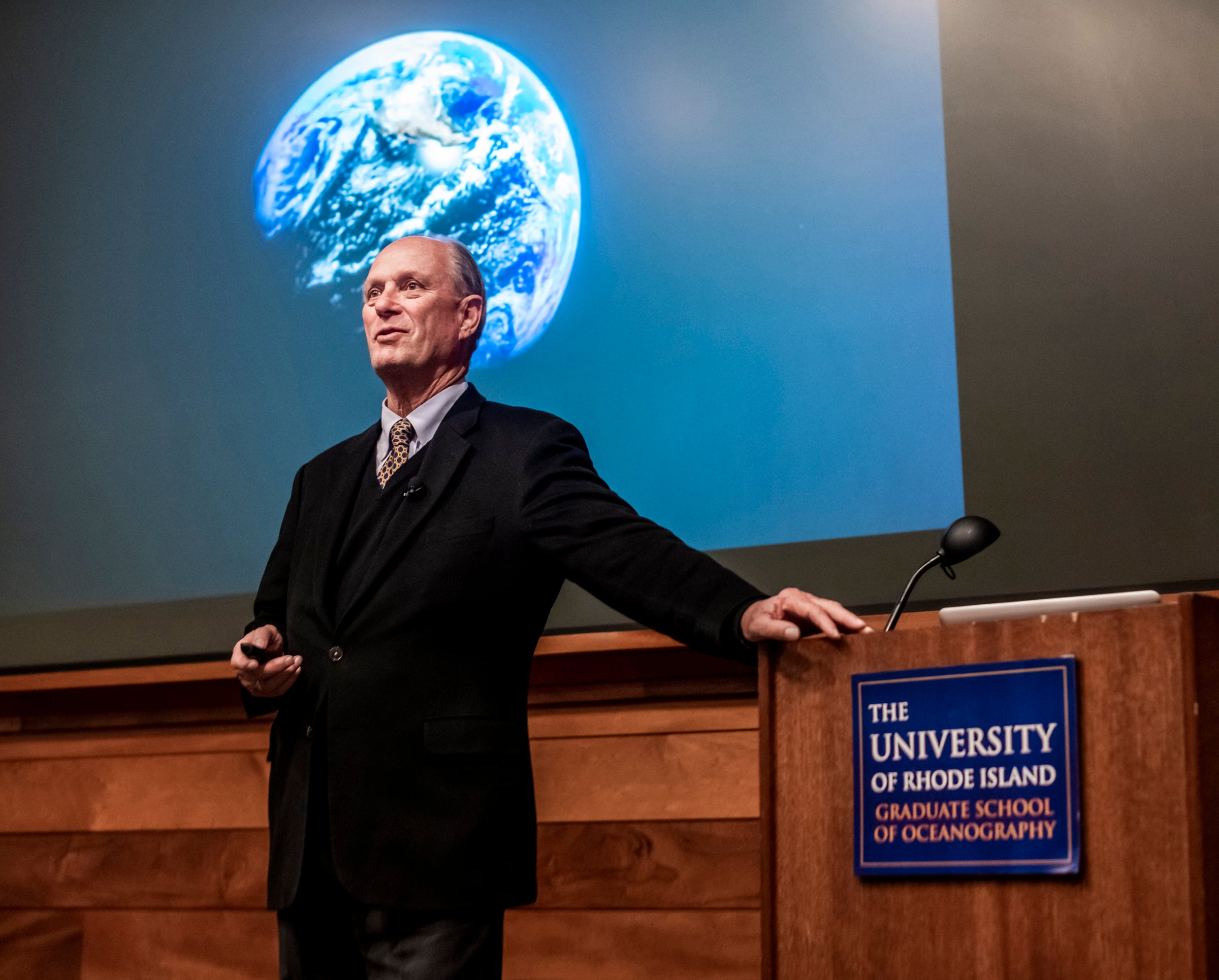NARRAGANSETT, R.I. – May 11, 2021 – He found the resting place of the Titanic, John F. Kennedy’s PT-109, the aircraft carrier Yorktown and numerous other modern and ancient shipwrecks, as well as hydrothermal vents and their exotic ecosystem that lives off the energy of the Earth instead of the sun. Now marine explorer Robert Ballard is looking back at his 50-year career of discovery by publishing a memoir, Into the Deep, recounting the backstories of many of his greatest adventures.
The University of Rhode Island oceanographer said that while he isn’t ready to stop exploring the marine world just yet, now is the time to tell his story.
“I’m stepping back a bit and pivoting to a mentoring stage in my life,” said Ballard, who will turn 79 in June. “I’m wrapping up what I’ve been doing and making a strategic pivot to other projects. Time is running out, and if we don’t embrace global change and acidification of the oceans and take steps to create conservation areas, we’re in trouble.”
While his book features numerous stories about his favorite research expeditions and discoveries, the major revelations are more personal. For the first time, he publicly discusses the difficult task of following in his brilliant older brother’s footsteps, the inspiration he received from his younger sister, who has a handicap, his first marriage, the death of his son in a car accident, and other aspects of his personal life, including his recent discovery that he is dyslexic.
“I’m a very private person, not one who talks about who I am, but I decided that maybe it’s time, and maybe I can do some good,” Ballard said. “Everyone needs to understand that dyslexics aren’t stupid, they’re just a different kind of human being. They see the world in a very different way.
“This book is a coming out party for my dyslexia,” he added. “I’m standing on a soapbox now and saying, ‘I’m dyslexic,’ and I feel so lucky.”
Written with New York Times investigative journalist Christopher Drew and to be released May 14 by National Geographic, the book is receiving rave reviews from such notable readers as Henry Kissinger, who calls it “a testament to the power of imagination, scientific rigor and dogged hard work.”
Fellow National Geographic explorer-in-residence Enric Sala said the book is “a page-turner, every chapter a cliffhanger that delivers yet another surprise.” And James Cameron, director of the movie Titanic, said “Bob Ballard was, and still is, a true exploration pioneer, and has inspired generations of ocean explorers, myself included.”
A companion article appears in the May issue of National Geographic magazine, and a television special mirroring the book will air June 14 on the National Geographic channel.
Ballard, who earned his doctorate from URI in 1976, joined the faculty of URI’s Graduate School of Oceanography in 2003, where he established a program in archaeological oceanography and developed the Inner Space Center, a facility he calls his proudest accomplishment at URI. The center, an international hub for ocean science and education, uses cutting-edge technology to facilitate, support and promote live ocean explorations around the globe in real time.
As he looks ahead to his 80s, Ballard is enjoying mentoring early-career scientists and engineers and training the next generation of ocean explorers.
“When I was growing up, my Kansas grandmother was full of sayings, and I remember one in particular,” he said. “She said, ‘Great is the person who plants a tree knowing they will never sit in its shade.’ That’s where I am now. I’m planting trees.”
But he’s not yet finished exploring. After a year of staying home due to the pandemic, he is looking forward to returning to sea this summer aboard the exploration vessel, Nautilus.
“I’ll be on the Nautilus a lot. It reminds me of when I sat on the beach watching my children build sandcastles and making sure they could make their dreams come true,” Ballard said. “I’ll be watching and mentoring this amazing team I’ve built.”
With funding from the National Oceanic and Atmospheric Administration’s Office of Ocean Exploration, Ballard and his research team will spend the next five years exploring America’s vast underwater landscape in the central and western Pacific. The effort is part of the Ocean Exploration Cooperative Institute, led by URI in partnership with the Woods Hole Oceanographic Institution, University of New Hampshire, University of Southern Mississippi, and the Ocean Exploration Trust.
In 2022, the program will be expanded with funding from NOAA and the National Geographic Society to focus on America’s coral reefs in the Pacific Ocean, 90% of which are under great stress due to global warming, pollution, and the acidification of the ocean.
“I’m not done yet; I’ve got more to do,” Ballard said. “But I am stepping back a bit. And I’m getting really good at it.”

